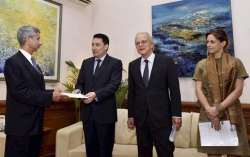One country can’t stop India’s NSG membership, says US
New Delhi:The United States is committed to India’s membership of the Nuclear Suppliers Group (NSG) and one country cannot stop international consensus on this, a senior US diplomat said in New Delhi on Wednesday. His

New Delhi:The United States is committed to India’s membership of the Nuclear Suppliers Group (NSG) and one country cannot stop international consensus on this, a senior US diplomat said in New Delhi on Wednesday.
His comments came after China, at the NSG plenary in Seoul earlier this month, stonewalled India’s entry into the 48-member group on the ground that it is not a signatory of a non-proliferation treaty (NPT).
"We are committed to having India in the Nuclear Suppliers Group," Thomas Shannon, Under Secretary of State for Political Affairs, said in an interaction with diplomats and officer trainees of the Indian Foreign Service (IFS).
"India's recent entry into the Missile Technology Control Regime (MTCR) highlights that India is a responsible and important player in non-proliferation," he said.
On May 12, India formally applied for a membership in the NSG. It was set up in response to India’s first nuclear test in 1974 and aims to prevent the proliferation of nuclear weapons.
India already enjoys most of the benefits of membership under a 2008 exemption to NSG rules granted to support its nuclear cooperation deal with Washington, even though it has developed atomic weapons and never signed the NPT, the main global arms control pact.
Shannon said "We regret that in Seoul, we were unable to open the space necessary to have India in the Nuclear Suppliers Group at this moment."
"We understand that in a consensus-based organisation, one country cannot stop international consensus."
Earlier in his address to the gathering, Shannon said that civil nuclear cooperation was a "very important symbol" of the India-US relationship.
"Where the nuclear question once divided us, today it brings us together," he said.
"Just a few weeks ago, President Obama and Prime Minister (Narendra) Modi welcomed the start of preparatory work on a site in Andhra Pradesh for six AP 1000 reactors to be built by an American company.
"This is expected to provide jobs in both countries and bring clean, reliable electricity that will help meet India's growing energy needs while reducing reliance on fossil fuels."
Shannon also referred to US Secretary of State John Kerry's remark that the US might not have another partnership that was so wide-ranging as the one with India.
"A key factor has certainly been the connection between our two peoples," he said.
"The three million Indian Americans are some of the most successful people in the United States. They have started 15 per cent of Silicon Valley companies, become governors and Members of Congress, and won the Miss America pageant."
The US official also pointed out that 130,000 Indians were studying in his country and more than a million Americans visited India last year.
As for bilateral trade ties, Shannon said that "US and Indian business leaders and young entrepreneurs have shown their own ambitions to work together".
"Annual trade between our countries is now over $107 billion a year, five times what it was a decade ago," he said.
He also said that US-India defence cooperation was much broader, as both countries now looked to each other as "priority partners" in the Asia-Pacific and Indian Ocean region.
"In fact, we see India as an anchor of stability in this dynamic region, and were pleased to finalise the text of a Logistics Exchange Memorandum of Understanding (Lemoa) this month," Shannon said.
He said both the US and India stood united against terrorism and violent extremism.
"We work together bilaterally and multilaterally to bring to justice the perpetrators of terrorism anywhere in the world, and dismantle infrastructure that supports them," he stated, adding that both sides recently finalised a new arrangement to share terrorist screening information.
Apart from terrorism, the other global threat the two countries were addressing together was climate change, the US official said.
"Climate change is a key challenge our leaders have committed to, including through the historic Paris Agreement," he said.
"Our leaders pledged to work towards full implementation of the Agreement and to seeing it enter into force as early as possible."
Shannon also said the US-India partnership was "indispensable" for peace and prosperity in Asia.
"That is why President Obama and Prime Minister Modi signed a Joint Strategic Vision Statement for the Asia Pacific and Indian Ocean Region last January," he said.
"We affirmed the importance of ensuring freedom of navigation and over flight throughout the region, especially in the South China Sea," he added.
(With Agency input)